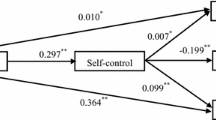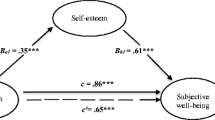Abstract
This study examined both the mediating and moderating effects of global self-esteem on the relationship between social support and subjective well-being among Chinese university students. Three hundred and ninety-one university students (260 males and 131 females) from two different Chinese universities completed the social support scale, the self-esteem scale and the subjective well-being scale. Hierarchical regression analysis showed that global self-esteem partially mediated the influence of social support on life satisfaction and positive affect, whereas it fully mediated the influence of social support on negative affect. Moreover, global self-esteem moderated the relationship between social support and life satisfaction, and positive affect, but not negative affect. When students reported a high level of global self-esteem, those with high social support reported higher scores in life satisfaction and positive affect than those with low social support. However, there were no differences in life satisfaction or positive affect between groups with high and low social support when global self-esteem was low. The significance and limitations of the results are discussed.



Similar content being viewed by others
References
Aiken, L., & West, S. G. (1991). Multiple regression: Testing and interpreting interactions. Newbury Park, CA, USA: Sage.
Baron, R. M., & Kenny, D. A. (1986). The moderator-mediator variable distinction in social psychological research: Conceptual, strategic and statistical considerations. Journal of Personality and Social Psychology, 51, 1173–1182.
Baumeister, R., & Leary, M. (1995). The need to belong: Desire for interpersonal attachments as a fundamental human motivation. Psychological Bulletin, 117, 497–529.
Bosson, J. K., Swann, W. B., & Pennebaker, J. W. (2000). Stalking the perfect measure of implicit self-esteem: The blind men and the elephant revisited? Journal of Personality and Social Psychology, 79, 631–643.
Chamberlain, K. (1988). On the structure of subjective well-being. Social Indicators Research, 20, 581–604.
Chen, S., Cheung, F. M., Bond, M. H., & Leung, J. P. (2006). Going beyond self-esteem to predict life satisfaction: The Chinese case. Asian Journal of Social Psychology, 9, 24–35.
Cohen, S., & Wills, T. A. (1985). Stress, social support and the buffering hypothesis. Psychological Bulletin, 98, 310–357.
Cohen, S., Gottlieb, B., & Underwood, L. (2000). Theoretical and historical perspectives. In S. Cohen, L. Underwood, & B. Gottlieb (Eds.), Social support measurement and intervention: A guide for health and social scientists (pp. 3–28). New York: Oxford University Press.
Cooper, H., Okamura, L., & Gurka, V. (1992). Social activity and subjective well-being. Personality and Individual Differences, 13, 573–583.
Davis, M. C., & Swan, P. D. (1999). Association of negative and positive social ties with fibrinogen levels in young women. Health Psychology, 18, 131–139.
Diener, E., & Diener, M. (1995). Cross-cultural correlates of life satisfaction and self-esteem. Journal of Personality and Social Psychology, 68, 653–663.
Diener, E., & Oishi, S. (2005). The nonobvious social psychology of happiness. Psychological Inquiry, 16, 162–167.
Diener, E., & Seligman, E. (2002). Very happy people. Psychological Science, 13, 81–84.
Diener, E., Emmons, R. A., Larsen, R. J., & Griffin, S. (1985). The satisfaction with life scale. Journal of Personality Assessment, 49, 71–75.
Dumont, M., & Provost, M. A. (1999). Resilience in adolescents: Protective role of social support, coping strategies, self-esteem, and social activities on experience of stress and depression. Journal of Youth and Adolescence, 28, 343–363.
Frazier, P. A., Tix, A. P., & Barron, K. E. (2004). Testing moderator and mediator effects in counseling psychology research. Journal of Counseling Psychology, 51, 115–134.
Gallagher, E. N., & Vella-Brodrick, D. A. (2008). Social support and emotional intelligence as predictors of subjective well-being. Personality and Individual Differences, 44, 1551–1561.
Hermans, H. J. M. (1992). Unhappy self-esteem: A meaningful exception to the rule. Journal of Psychology, 126, 555–570.
Kahn, J. H., Hessling, R. M., & Russell, D. W. (2003). Social support, health, and well-being among the elderly: What is the role of negative affectivity? Personality and Individual Differences, 35, 5–17.
Karademas, E. C. (2006). Self-efficacy, social support and well-being: The mediating role of optimism. Personality and Individual Differences, 40, 1281–1290.
Kim, H. S., Sherman, D. K., Ko, D., & Taylor, S. E. (2006). Pursuit of comfort and pursuit of harmony: Culture, relationships, and social support seeking. Personality and Social Psychology Bulletin, 32, 1595–1607.
Kinney, D. A. (2006). Mediation. Available from: http://www.davidakenny.net/cm/mediate.htm. Retrieved December 21, 2011.
Kliewer, W., & Sandler, I. N. (1992). Locus of control and self-esteem as moderators of stressor–symptom relations in children and adolescents. Journal of Abnormal Child Psychology, 20, 393–413.
Kong, F., & You, X. (2011). Loneliness and self-esteem as mediators between social support and life satisfaction in late adolescence. Social Indicators Research,. doi:10.1007/s11205-011-9930-6.
Kong, F., Zhao, J., & You, X. (2012). Trait emotional intelligence and mental distress: The mediating role of positive and negative affect. International Journal of Psychology,. doi:10.1080/00207594.2012.666352.
Kuppens, P., Realo, A., & Diener, E. (2008). The role of positive and negative emotions in life satisfaction judgment across nations. Journal of Personality and Social Psychology, 95, 66–75.
Kwan, V. S. Y., Bond, M. H., & Singelis, T. M. (1997). Pan cultural explanations for life satisfaction: Adding relationship harmony to self-esteem. Journal of Personality and Social Psychology, 73, 1038–1051.
Leary, M. R. (2004). The sociometer, self-esteem, and the regulation of interpersonal behaviour. In R. F. Baumeister & K. D. Vohs (Eds.), Handbook of self-regulation—Research, theory, and applications (pp. 373–391). London: The Guilford Press.
Leary, M. R., & Baumeister, R. F. (2000). The nature and function of self-esteem: Sociometer theory. Advances in experimental social psychology, 32, 1–62.
Longmore, M. A., & Demaris, A. (1997). Perceived inequity and depression in intimate relationships: The moderating effect of self-esteem. Social Psychology Quarterly, 60, 172–184.
Lu, L., & Lin, Y. (1998). Family roles and happiness in adulthood. Personality and Individual Differences, 25, 195–207.
Mack, J. E. (1983). Self-esteem and its development: An overview. In J. E. Mack & S. L. Ablon (Eds.), The development and sustenance of self-esteem in childhood (pp. 1–42). New York: International Universities Press.
Mäkikangas, A., & Kinnunen, U. (2003). Psychosocial work stressors and well-being: Self-esteem and optimism as moderators in a one-year longitudinal sample. Personality and Individual Differences, 35, 537–557.
McWhirter, B. T., Tricia, M., Besett-Alesch, T. M., Horibata, J., & Gat, I. (2002). Loneliness in high risk adolescents: The role of coping, self-esteem, and empathy. Journal of Youth Studies, 5, 69–84.
Mikulincer, M., & Florian, V. (1998). The relationship between adult attachment styles and emotional and cognitive reactions to stressful events. In J. A. Simpson & W. S. Rhodes (Eds.), Attachment theory and close relationships (pp. 143–165). New York: Guilford.
Moradi, B., & Subich, L. M. (2004). Examining the moderating role of self-esteem in the link between experiences of perceived sexist events and psychological distress. Journal of Counseling Psychology, 51, 50–56.
Mruk, C. (1995). Self-esteem: Research, theory, and practice. New York: Springer.
Neto, F. (2001). Satisfaction with life among adolescents from immigrant families in Portugal. Journal of Youth and Adolescence, 30, 53–67.
Oishi, S., Diener, E., Lucas, R. E., & Suh, E. M. (1999). Cultural variation in predictors of life satisfaction: A perspective from needs and values. Personality and Social Psychology Bulletin, 25, 980–990.
Pavot, W., & Diener, E. (1993). Review of the satisfaction with life scale. Psychological Assessment, 5, 164–172.
Petra, S., & Ronald, F. (2003). The influence of social support and problematic support on optimism and depression in chronic illness: A prospective study evaluating self-esteem as a mediator. Health Psychology, 22, 123–129.
Preacher, K. J., & Hayes, A. F. (2004). SPSS and SAS procedures for estimating indirect effects in simple mediation models. Behavior Research Methods, 36, 717–731.
Rosenberg, M. (1965). Society and the adolescent self-image. Princeton, NJ, USA: Princeton University Press.
Rosenberg, M. (1979). Conceiving the self. New York: Basic Books.
Sarason, I. G., Levine, H. M., Basham, R. B., & Sarason, B. R. (1983). Assessing social support: The social support questionnaire. Journal of Personality and Social Psychology, 44, 127–139.
Schimmack, U., & Diener, E. (2003). Predictive validity of explicit and implicit self-esteem for subjective well-being. Journal of Research in Personality, 37, 100–106.
Skok, A., Harvey, D., & Reddihough, D. (2006). Perceived stress, perceived social support, and wellbeing among mothers of school-aged children with cerebral palsy. Journal of Intellectual and Developmental Disability, 31, 53–57.
Suldo, S. M., & Huebner, E. S. (2006). Is extremely high life satisfaction during adolescence advantageous? Social Indicators Research, 78, 179–203.
Wang, X. D., Wang, X. L., & Ma, H. (1999). Rating scales for mental health: Social support rating scale. China, Beijing: The Journal of Chinese Psychological Press.
Wills, T. A. (1991). Social support and interpersonal relationships. In M. S. Clark (Ed.), Prosocial behavior (pp. 265–289). Newbury Park, CA, USA: Sage.
Wills, T. A., & Fegan, M. F. (2001). Social networks and social support. In A. Baum, T. A. Revenson, & J. E. Singer (Eds.), Handbook of health psychology (pp. 209–234). Mahwah, NJ, USA: Erlbaum.
Wilson, T. D., Lindsey, S., & Schooler, T. Y. (2000). A model of dual attitudes. Psychological Review, 107, 101–126.
Yarcheski, A., Mahon, N. E., & Yarcheski, T. J. (2001). Social support and well-being in early adolescents: The role of mediating variables. Clinical Nursing Research, 10, 163–181.
Zhang, L., & Leung, J. (2002). Moderating effects of gender and age on the relationship between self-esteem and life satisfaction in mainland Chinese. International Journal of Psychology, 37, 83–91.
Zhao, J., Kong, F., & Wang, Y. (2012). Self-esteem and humor style as mediators of the effects of shyness on loneliness among Chinese college students. Personality and Individual Differences, 52, 686–690.
Author information
Authors and Affiliations
Corresponding authors
Rights and permissions
About this article
Cite this article
Kong, F., Zhao, J. & You, X. Self-Esteem as Mediator and Moderator of the Relationship Between Social Support and Subjective Well-Being Among Chinese University Students. Soc Indic Res 112, 151–161 (2013). https://doi.org/10.1007/s11205-012-0044-6
Accepted:
Published:
Issue Date:
DOI: https://doi.org/10.1007/s11205-012-0044-6




